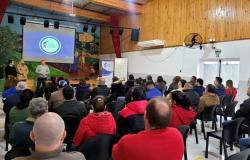One of the most important risk rating agencies in the world, Fitch, gave Argentina the “CC” rating this Tuesday, the parameter prior to falling into default. The news comes amid the Government’s problems in accumulating reserves in times of heavy harvest and political conflicts in reaching the necessary consensus to allow the Base Law to be sanctioned.
“Argentina’s ‘CC’ rating indicates Fitch’s view that a bond restructuring or other default appears likely in the coming yearsgiven the persistent uncertainty surrounding the State’s ability to achieve a sustained accumulation of international reserves and regain access to global capital markets, and therefore make large foreign currency bond payments in the coming years,” he noted. The report specified: “To meet debt payments, the sovereign will likely need to achieve further reserve accumulation and also regain access to international markets to refinance some of it.”
In dialogue with The uncoveringthe former president of the Central Bank Miguel Pesce stated: “The risk rating agencies have presented difficulties in their performance in various circumstances. The government’s inclination to be evaluated by the same procedures exacerbates its problems.”
“Everyone is beginning to agree that the deep recession hinders economic development. The government suffers the paradox of its convictions and those who judge it. They demand a strong recession and then criticize its consequences,” said the former official.
In line with Fitch, the chief economist of the international investment bank Goldman SachsRobin Brooks, maintained that Argentina and Egypt “they are trapped in the same vicious circle”. And he explained: “They are devalued and then, immediately afterwards, they are pegged back to the US dollar. Then, high inflation causes the real exchange rate to rise again. Argentina is already there. Egypt is reaching that point. Again and again again”.
Fitch’s harsh report on the Milei government
“Javier Milei’s administration has made initial progress on economic adjustments since taking office in December 2023, through executive actions rather than laws. However, Achieving sufficient durable adjustment to build reserves and regain market access may also require broader policy support and reforms, which remains to be seen, while growing tensions over the new policy mix increase uncertainty.”evaluated the risk rating agency.
“Some tensions within this policy mix are becoming evident. The crawling peg has allowed for a rapid real revaluation of the peso and may be difficult to sustain, which could weaken its effectiveness as an anchor for price expectations,” the document noted. . An exit strategy from currency controls and negative real interest rates is still “unclear, and these policies could undermine confidence the longer they remain in place.”Fitch added. According to his technicians, inflation “may face further resistance after falling to around 5% in May, due to economic recovery, wage indexation and political uncertainties”.
On the other hand, the sustainability of the reserve accumulation “is not clear”, given that “it has been made possible by the deferral of dollars owed to importers through the issuance of BOPREAL securities and by stricter restrictions on imports that are now expiring”. Real peso appreciation and “economic recovery could also boost import demand later in 2024,” the report added. And they stressed: “Forex purchases have already slowed sharply in recent weeks, despite the ongoing soybean harvest.”
Doubts about debt payment
Elsewhere, the report warned that “large debt payments are coming.” The amounts owed “will increase significantly to 9,000-10,000 million dollars in 2025-2027 and will coincide with other payments by provinces and the BCRA (in BOPREAL),” the document ignored. To meet these payments, the Government “will probably need to achieve a greater accumulation of reserves and also regain access to the international market to refinance part of it,” he said.
Finally, the report was lapidary regarding the near future: “Fitch remains unsure whether Argentina will be able to achieve these goals. Regaining access to markets may not only require greater macroeconomic adjustments, but also evidence of broader political acceptance and the preservation of social support. This may be particularly difficult to achieve before the midterm legislative elections in November 2025.”
Meanwhile, Argentina negotiates with the IMF
This Tuesday, the Minister of Economy, Luis Caputoannounced that after the staff of the International Monetary Fund (IMF) carry out this Thursday the review of the agreed program, “a new program” will be negotiated to try to ensure that “new money arrives” in this way necessary to get out of the exchange restrictions popularly known as “stocks”.
“We are in the process of reviewing the Fund, which will be on the 13th (June, this Thursday) and from there we will begin to negotiate a new program with them.. We are not announcing it now because logically we must first agree on it with the Fund and eventually try to ensure that new money arrives with this new program,” Caputo announced in dialogue with the executive director of the Freedom and Progress Foundation, Aldo Abramin the Forum “Rebirth of freedom in Argentina”, which takes place at the Hilton Hotel in this city.
After presenting at the Forum, Caputo identified four factors as necessary to get out of the dollar’s exchange rate traphighlighting that the first of them, the fiscal balance, is already consolidated. The next two, he explained, are the balance of demand stocks and solve flow problemsin which he highlighted the progress made, especially with SMEs that already have 30 days to obtain foreign currency.
The fourth and final factor is that there is “a reasonable relationship between the amount of reserves and remunerated liabilities”a variable in which, he said, “we are not there yet” but that once they have the resources that the IMF could provide, they would leave the doors open to lifting the stocks.
Thus, Caputo was optimistic despite the lack of definitions on this point on the part of the IMF in the last days. Last Thursday, at her regular press conference, the organization’s spokesperson, Julie Kozack explicitly avoided giving any advance regarding a new program between the IMF and Argentina that may lead to the sending of extra funds with which the Government wants to get out of the trap.






